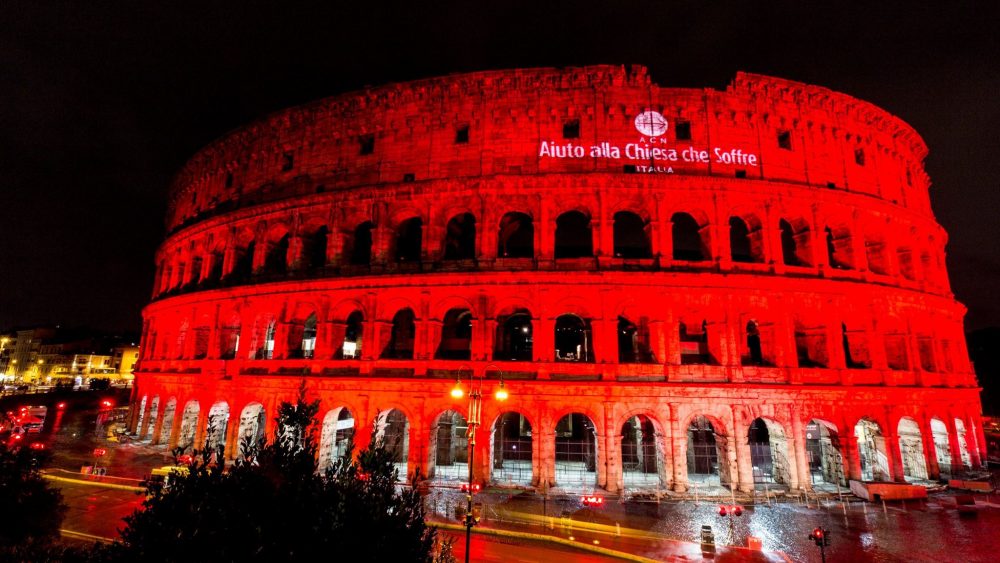Rome’s Colosseum was illuminated red over the weekend to remember persecuted Christians across the world. The Maronite Cathedral of St Elijah in war torn Aleppo and St Paul’s church in the Iraqi city of Mosul were also illuminated in red, symbolising the blood of the many recent Christian martyrs there.
The event was organised by Aid to the Church in Need, a Christian charity that supports suffering Christians in over 140 countries around the world.
One of the speakers at the Rome event, Rebecca Bitrus, a Nigerian Christian woman who was held for two years after she was abducted by Boko Haram Islamist militants, told of how she was repeatedly beaten and raped.
According to the Business Standard, Bitrus said that despite her ordeal at the hands of the extremist group, she never lost her trust in God, not even when her one-year-old son was killed or when she was tortured and raped, resulting in the birth of another child. When she finally managed to escape, many people urged her to get rid of the child, but with the help of local Church leaders, she has learned to accept and love the son of her captors.
In 2014, more than 240 schoolgirls were kidnapped by Boko Haram. Over 100 are still missing. In mid-February this year, there was another attack a school in the town of Dapchi in the north-eastern Nigerian state of Yobe, where over 100 schoolgirls were kidnapped.
But targeted violence against Christians comes not only from the Islamic militants of Boko Haram. Clashes with militants among the predominantly Muslim Fulani herdsmen have claimed thousands of Christian lives in Nigeria’s ‘Middle Belt’ (an area of the Muslim-dominated north, but also the centre of the Christian presence in the north).
Stories coming out of the region tell a consistent tale of harassment, discrimination and persecution.
Thirty-eight million people belong to the larger Fulani cluster of ethnic groups found in pockets across 19 Central and West African countries. They form the world’s largest nomadic group roaming this large area in search of grazing for their cattle.
As the Fulani herders increasingly migrate southward, they have come into conflict over resources with the mostly Christian grain farmers.
There have been multiple clashes between Fulani herdsmen and farmers since the start of 2018. According to Amnesty International, at least 168 people have been killed. The organisation estimates that 549 deaths were recorded last year, along with thousands of displaced people.
Stories coming out of the region tell a consistent tale of harassment, discrimination and persecution. In Taraba State, for example, Hausa-Fulani attacks on Christian communities have caused mass internal displacement. Thousands of indigenous farmers have scrambled to the state capital of Jalingo for safety.
Research in three states about non-Boko Haram violence showed that 88 per cent of victims in Benue State were Christians, 70 per cent in Taraba State, and 75 per cent in Nasarawa State. “Christians are being driven out of their ancestral homes, and those who refused and stayed were indiscriminately targeted,” according to World Watch Monitor. “The vacated lands are being grabbed by those responsible for the displacement.”
The US Department of Defence’s Africa Centre for Strategic Studies estimated that, by January this year, more than 60,000 people had died since 2001 in pastoralist-related violence in Nigeria. Thousands more have been injured in the attacks and hundreds of women have been kidnapped.
Fulanis have destroyed countless homes and churches and seized large swathes of land and property.
But several other incidents of Christian persecution in the past few months have cemented Nigeria as a difficult place for Christians to live.
In January, a female student was arrested after converting from Islam to Christianity. Nabila Umar Sanda, 19, became friends with Simput Dafup, a 33-year-old Christian, who, once she expressed an interest in Christianity, invited her to meet a local church leader, Jeremiah Datim. Both Nabila Umar Sanda and Simput Dafup were arrested later that day and are still being held in an unknown location.
Targeted violence against Christians comes not only from the Islamic militants of Boko Haram.
Technically, the Constitution of the Federal Republic of Nigeria guarantees the right to anyone to propagate their faith and the right to also practise any religion of one’s choice. However, converts often face rejection from their Muslim families and pressure to recant.
The north of the country is largely controlled by Islamic groups, including the Islamic State affiliated group Boko Haram. The south is where most of the Christians live. Believers experience discrimination and exclusion, and violence from militant Islamic groups, resulting in the loss of property, land, livelihood, physical injury or death.
In February, a Christian student was killed in north-east Nigeria (a region deeply affected by Boko Haram). Several others were injured when Muslim students set a classroom on fire at the Modibbo Adama University of Technology. The Muslim students said they were angered by a message posted by a Christian student on Facebook on 18 December, 2017. They said the message was an insult to their prophet, Muhammad.


